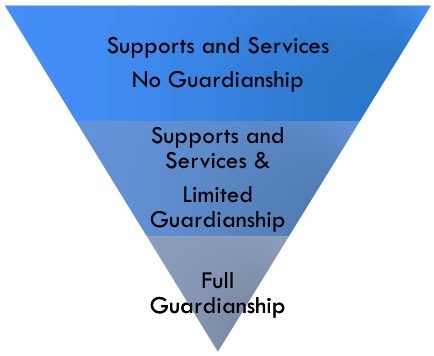Table of Contents
Disability Rights Texas Handout
To request this handout in ASL, Braille, or as an audio file, contact us.
Using Supports and Services as an Alternative to Guardianship
Guardianship Reforms
The legislature mandated that a probate court must consider alternatives to guardianship and supports and services before a guardianship is created.
Least Restrictive Alternatives Policies
Guardianship Policy
Texas courts have the authority to appoint a guardian with full or limited authority over an incapacitated person. However, a guardianship should be only as restrictive:
- as indicated by the person’s actual mental or physical limitations; and
- as necessary to promote and protect his or her well-being.
Tex. Est. Code § 1001.001(a)
The Continuum

“…the court shall design the guardianship to encourage the development or maintenance of maximum self-reliance and independence in the incapacitated person, including by presuming that the incapacitated person retains capacity to make personal decisions regarding the person’s residence.” Tex. Est. Code § 1001.001(b)
Guardianship Policy (cont.)
- When an application for guardianship is filed, a court investigator must determine whether a less restrictive alternative to guardianship is appropriate. Tex. Est. Code § 1054.151.
- NEW: All parties – the applicant, attorney ad litem, guardian ad litem, physicians, and the court have an obligation to consider less restrictive alternatives and supports and services.
Supports and Services
Available formal and informal resources and assistance
that enable an individual to:
- Meet the individual’s needs for food, clothing or
shelter; - Care for the individual’s physical or mental health;
- Manage the individual’s financial affairs; or
- Make personal decisions regarding residence, voting, operating a motor vehicle, and marriage.
Tex. Est. Code § 1002.031.
Informal Supports and Services
- Family
- Friends
Formal Supports and Services
- Alternatives to Guardianship
- Medicaid and General Revenue services
- Supported Decision-Making
Other Supports and Services
- Free and Reduces Meals
- Prescription Delivery
- Free and Reduced Transportation
- Direct Deposits & Payments
- Joint Accounts and Debit Cards
- Daily Call or Home Visit Services
- Technology
Supports and Services through Medicaid
Medicaid Entitlement Long Term Services and Supports provided by HHSC: https://hhs.texas.gov/services/aging/long-term-care
Medicaid Waiver Home and Community Based Programs provided by HHSC: https://hhs.texas.gov/sites/default/files/documents/doing-business-with-hhs/providers/resources/ltss-available-texas-medicaid-state-plan.pdf
Medicare Home Health Care: https://www.medicareinteractive.org/get-answers/medicare-covered-services/home-health-services/home-health-basics
Where to call to get HHS Long-Term Care Services?
To obtain information about long-term care for older adults or persons with disabilities, call 1-855-937-2372.
https://hhs.texas.gov/services/aging/long-term-care/aging-disability-resource-center/who-should-call-adrc
Supports and Services (cont.)

All parties must now consider whether supports and services would avoid the need for guardianship.
- Applicants § 1101.001(3-a), (3-b)
- Guardians Ad Litem § 1054.054(c)(2)
- Attorneys Ad Litem § 1054.004(a)(4)
- Court Investigators § 1054.151
- Courts § 1101.101(a)(1)(E), (c)(2)
- Physicians § 1101.103(b)(4)(E), (b)(6), (b)(6-a)
Medical Exam
NEW: The letter or certificate from a physician supporting an application for guardianship must state:
- Whether the proposed ward would benefit from supports and services that would allow the individual to live in the least restrictive environment; Tex. Est. Code § 1101.103(b)(6) and
- Whether guardianship is necessary and, if so, what powers or duties of the guardian should be limited if the proposed ward receives supports and services. Tex. Est. Code § 1101.103 (b)(6-a).
Using Supports and Services to Limit or End Guardianship
Initial Guardianships
BEFORE APPOINTING A GUARDIAN: EVIDENCE REQUIRED
Before appointing a guardian, the probate court must find by clear and convincing evidence that alternatives to guardianship and supports and services have been considered and determined not to be feasible.
If the court grants a limited guardianship, the court must specifically state whether the proposed ward lacks sufficient capacity with supports and services to make personal decisions regarding residence, voting, operating a motor vehicle, and marriage.
Tex. Est. Code § 1101.101(a)(1)(D) & (E) and (c)
Restoration of Capacity
THE ROLE OF SUPPORTS AND SERVICES
NEW: A guardianship shall be closed when the court finds that the ward has sufficient capacity with supports and services to care for himself or herself and to manage his or her property. Tex. Est. Code § 1202.001(b)(2).
NEW: A ward or any interested person may petition the court for the full or partial restoration of rights, including the right to decide their residence if he or she has sufficient capacity with or without supports and services. Tex. Est. Code § 1202.051(3).
NEW: The court shall consider whether the guardianship is needed and specific power or duties of the guardian should be limited if the ward receives supports and services. Tex. Est. Code § 1202.151(a).
NEW: The court order must state any supports and services needed for the restoration or modification of the guardianship. Tex. Est. Code § 1202.154(a)(4).
REQUIRED FINDINGS
- Before ordering the settlement and closing of the guardianship, the court must find that the person is no longer partially or fully incapacitated.
- Before granting additional powers or duties to the guardian, the court must find that the current nature and degree of incapacity warrants modification and that some or all rights need to be further restricted.
- NEW: Before limiting the powers or duties granted to the guardian, the court must find that the nature and degree of incapacity, with or without supports and services, warrants modification and that some of the individual’s rights need to be restored, with or without supports and services.
Tex. Est. Code § 1202.153.
Transition to Supported Decision-Making Agreement
What is Supported Decision-Making?
“A process of supporting and accommodating an adult with a disability to enable the adult to make life decisions, including decisions related to where the adult wants to live, the services, supports, and medical care the adult wants to receive, whom the adult wants to live with, and where the adult wants to work, without impeding the self-determination of the adult.” Tex. Est. Code §§ 1357.002(3); 1357.003.
“…guardianship is no longer warranted because there is now a system of supported decision-making in place that constitutes a less restrictive alternate to the Draconian loss of liberty entailed by a plenary… guardianship. This use of supported decision-making, rather than a guardian’s substituted decision-making, is also consistent with international human rights.” In re the Guardianship of Dameris 956 N.Y.S.2d 848, 853 (2009).
Supported Decision-Making and Restoration
- NEW: Persons under guardianship can petition the court to retain counsel of their choosing to assist with restoration or transitioning to a supported decision-making agreement. Tex. Est. Code § 1151.351(b)(17).
- Limitation: the individual must retain the right to contract. Tex. Est. Code § 1054.006(a)(1).
Last updated: April 7, 2017
Publication Code: SDM12

www.DRTx.org
Statewide Intake: 1-800-252-9108
Sign Language Video Phone: 1-866-362-2851
Purple 2 Video Phone: 512-271-9391
Online Intake available 24/7: intake.DRTx.org
Disclaimer: Disability Rights Texas strives to update its materials on an annual basis, and this handout is based upon the law at the time it was written. The law changes frequently and is subject to various interpretations by different courts. Future changes in the law may make some information in this handout inaccurate.
The handout is not intended to and does not replace an attorney’s advice or assistance based on your particular situation.